| Article ID | Journal | Published Year | Pages | File Type |
|---|---|---|---|---|
| 5662575 | European Geriatric Medicine | 2016 | 6 Pages |
ObjectivesTo reduce the frequency of readmissions in a population of geriatric patients (â¥75 years) admitted to an emergency department.MethodsThe study was quasi-RCT. Consecutive admission days were randomised to intervention or control. Admitted eligible patients belonged to the assigned day's strategy. Intervention comprised a geriatrician and nurse home visit on the day following hospital discharge. Control patients underwent our standard procedure, including follow-home by a carer or a telephone call the next day.Results1330 patients were included. Intervention group readmissions were significantly reduced compared to controls (12% vs. 23%; P < 0.001). The intervention group adjusted hazard ratio was 0.50 (95% CI: 0.38-0.65; P < 0.001). Total hospitalisation was shorter for the intervention group: median (IQR): 2 (1-7) vs. 3 (1-8) days; P = 0.03. No group mortality difference was statistically significant (intervention 12% vs. 14%; P = 0.25).ConclusionsA geriatrician and specialised nurse home-visit during the first days following hospital discharge reduces the readmission rate for acute medical patients by almost 50%, compared to patients accompanied home or subsequently telephoned. Hospitalisation was reduced, but 30-day mortality did not differ significantly between groups.
